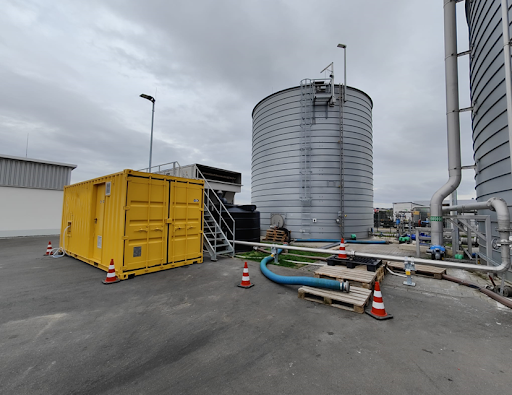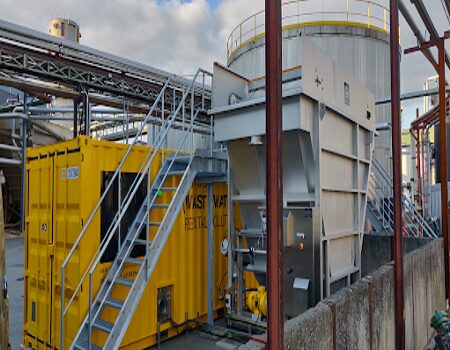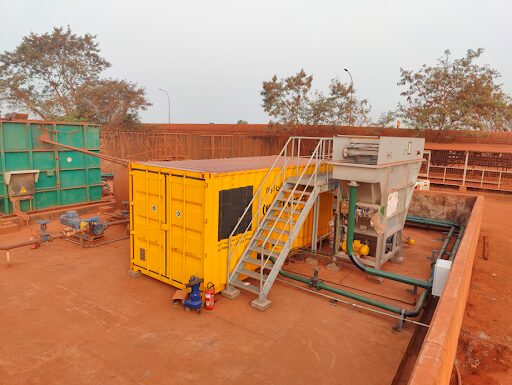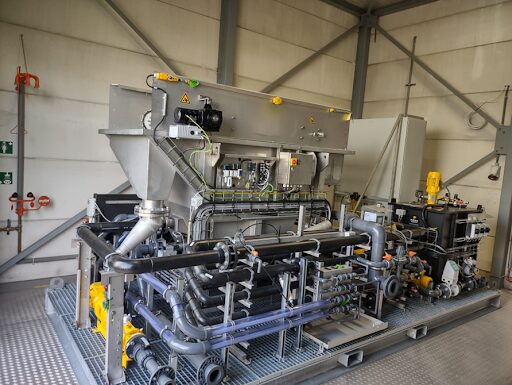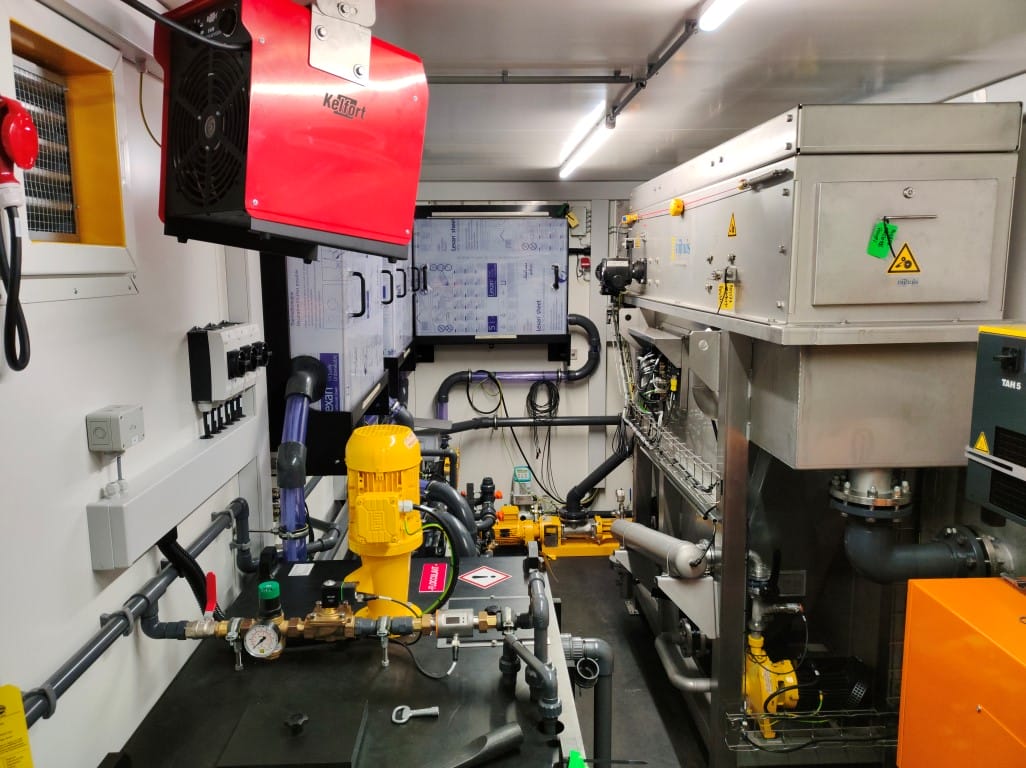Flocculation & Flotation Systems
Flocculation & Flotation in Wastewater Treatment
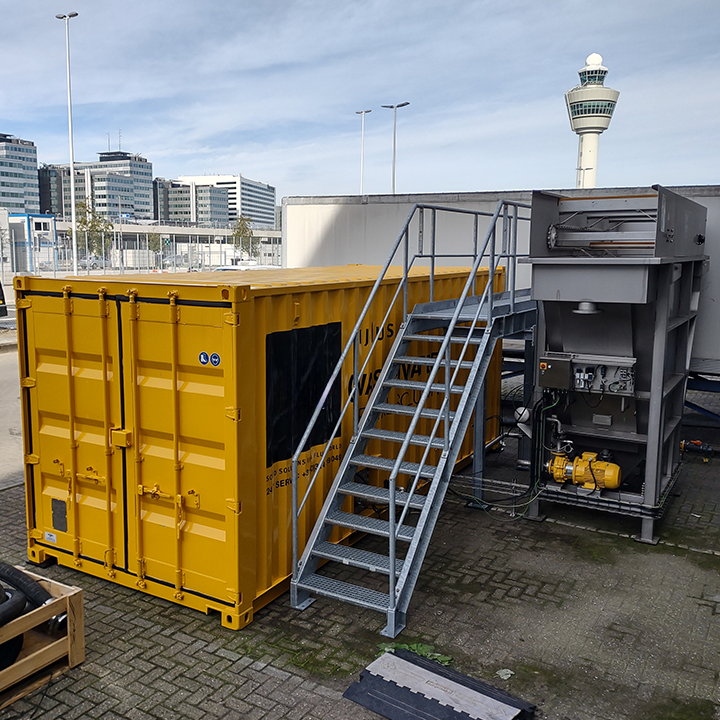
Flocculation and flotation are essential processes used in wastewater treatment and water purification.
Flocculation in wastewater treatment involves the addition of chemicals called flocculants to wastewater. These flocculants cause small particles in the wastewater to clump together, forming larger, heavier particles called flocs. These flocs then settle to the bottom of the tank, where they can be easily removed. This process significantly improves the efficiency of removing pollutants and contaminants from wastewater.
Flotation in water treatment, often using a technique called Dissolved Air Flotation (DAF), introduces tiny air bubbles into the water. These bubbles attach to suspended particles, such as oil, grease, and solids, causing them to float to the surface. Once at the surface, these particles can be skimmed off, resulting in cleaner water. This technique is particularly effective in treating industrial wastewater and in pre-treating water for further purification processes.
Both flocculation and flotation play a crucial role in ensuring the effective removal of contaminants from wastewater, making it safer for discharge or reuse. By enhancing the aggregation of particles and utilising air bubbles for separation, these processes contribute to cleaner water and a healthier environment.
Discover the benefits of mobile flotation for your plant
Talk to an expert
Flocculation & Flotation IPF and ICF ranges
Mobile Water Solutions’ IPF series is a versatile, stainless steel solution designed for both municipal and industrial wastewater treatment. Available in space-saving skid-mounted or containerised configurations, each unit comes equipped with everything you need: a feed pump, chemical container, advanced Dissolved Air Flotation (DAF) system, and a sludge pump.
The IPF series can handle a wide range of flow rates (2 to 135 m³/h) and load capacities (15 to 200 D.S kg/h), ensuring it can meet the needs of various applications. It also ensures compliance with chloride levels under 1,500 mg/l. This proven technology offers numerous benefits, including efficient contaminant removal, a compact design, no upfront capital investment (CAPEX), and the convenience of online monitoring.
Typical Applications
Industrial and municipal wastewater
Our flotation and flocculation solutions provide a flexible and efficient way to handle changing wastewater conditions. This helps protect the environment, keep operations running smoothly, and meet regulations. They’re also a smart alternative to investing in permanent infrastructure.
Removal of suspended solids, oil and greases, and coagulated & flocculated particles
Our solutions are adaptable, can be quickly set up, and effectively remove suspended solids, oil and grease, and coagulated or flocculated particles from wastewater.
Activated sludge solution for a continuous biological treatment
This solution improves activated sludge processes by being adaptable, scalable, customisable, and quick to set up. It ensures reliable and efficient biological treatment that meets regulations, even in difficult or changing situations.
High wastewater flow and load
Ensuring that the treatment capacity matches the influx of wastewater and maintains effective treatment during peak times. The assets can be adjusted based on volume and load requirements.
Wastewater variations
Addressing sudden or seasonal changes in industrial processes to prevent overloading existing infrastructure. The assets can be adjusted based on volume and load requirem

Success Story
One of Europe’s leading sugar beet producers faced efficiency challenges in their anaerobic treatment due to high solids content. We provided a tailored solution with our IPF90 containerized pre-treatment unit for 6 months.
This all-inclusive system includes pumps, chemical dosing, and controls within a single container. Its advanced automation ensures adaptability across varying water specifications. Boasting a high flow rate of up to 90 m³/h and a D.S. load capacity of 175 kg/h, the containerized setup optimizes space utilization. Remote monitoring guarantees seamless oversight, enhancing anaerobic treatment efficiency.
Clients also gain access to process experts and personalized operational support, ensuring a successful outcome.
Flocculation & Flotation FAQs
What is flocculation?
Flocculation is a process used in water and wastewater treatment to remove suspended particles. It involves adding chemicals called flocculants that cause fine particles to clump together into larger aggregates, or “flocs.” These flocs can then be more easily separated from the water through sedimentation, filtration, or flotation, resulting in cleaner water.
What is flotation?
Flotation is a process that separates suspended solids, oils, and other contaminants from water by using air bubbles. The bubbles attach to the particles, causing them to float to the surface, where they can be skimmed off. This method is particularly effective for removing fine particles and oily substances from industrial wastewater.
What industries typically utilise flocculation and flotation technologies?
Flocculation and flotation technologies are widely used in various industries that require effective water and wastewater treatment. Key industries include Mining, Municipal Water Treatment, Oil and Gas, Food and Beverage, Pulp and Paper, and Chemical Manufacturing.
What is DAF?
DAF (Dissolved Air Flotation) is a water treatment process that clarifies wastewater by removing suspended solids, oils, and greases. In this process, air is dissolved in the water under pressure and then released at atmospheric pressure in a flotation tank. The released air forms tiny bubbles that attach to the suspended particles, causing them to float to the surface. The floating material is then skimmed off, leaving the treated water below.









